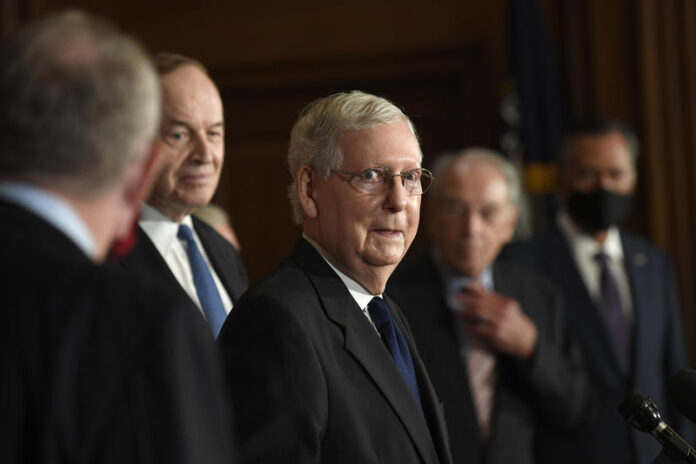
On the cusp of the second impeachment battle in just over a year, Senate Majority Leader Mitch McConnell (R-Ky.) is circulating a memo to Republican senators that outlines how a potential Senate trial would work for President Trump — proceedings that would all but certainly occur after he leaves the White House.
In the memo, obtained by The Washington Post, McConnell’s office notes that the Senate will not reconvene for substantive business until Jan. 19, which means the earliest possible date that impeachment trial proceedings can begin in the Senate is the day before President-elect Joe Biden is inaugurated.
Although the Senate will hold two pro forma sessions next week, on Jan. 12 and Jan. 15, it is barred from conducting any kind of business during those days — including “beginning to act on received articles of impeachment from the House” — without agreement from all 100 senators. With a cadre of Trump-allied senators in the Republican conference, that unanimous consent is highly unlikely.
“Again, it would require the consent of all 100 Senators to conduct any business of any kind during the scheduled pro forma sessions prior to January 19, and therefore the consent of all 100 Senators to begin acting on any articles of impeachment during those sessions,” the memo from McConnell emphasized.
In effect, that makes the matter of an impeachment trial an issue that will need to be taken up by Sen. Charles E. Schumer (D-N.Y.), the incoming majority leader, in the first days of the Biden presidency — a move that would almost certainly distract from the president-elect’s immediate agenda to battle the coronavirus pandemic and ensure that his Cabinet nominees get confirmed.
Absent a unanimous agreement before Jan. 19 to formally begin acting on any articles of impeachment, the McConnell memo outlines an expected scenario should the House impeach Trump in the coming days:
●On Jan. 19, the Senate would receive a message from the House that it has appointed impeachment managers, and that the Senate would be ready to receive it.
●On Jan. 19 or 20, the House impeachment managers would exhibit the articles.
●On Jan. 20 or 21, the Senate would proceed to consideration of the impeachment articles at 1 p.m., and officially begin the trial. McConnell’s memo noted that the “Senate trial would therefore begin after President Trump’s term has expired — either one hour after its expiration on January 20, or twenty-five hours after its expiration on January 21.”
There is also a question of who exactly would preside over a trial of a former president. Senate impeachment rules require Chief Justice John G. Roberts Jr. preside over a trial of a sitting president, but whether he would have to once Trump is no longer president is “unclear,” the memo said.

The Washigton Post
